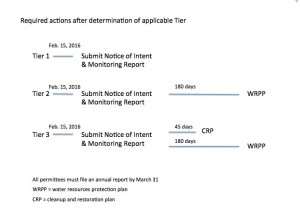SB-837 Water Issues
On June 27, 2016, the California legislature passed Senate Bill No. 837 (SB 837) to amend certain areas of the MMRSA. SB 837 includes substantive changes to the law, which affect the various state agencies involved in regulating cannabis businesses as well as potential licensees, including the State Water Resources Control Board (SWRCB).
Under the law, the SWRCB, in consultation with California Department of Fish and Wildlife (CDFW) and California Department of Food and Agriculture (CDFA), must ensure that individual and cumulative effects of water diversion and discharge associated with cannabis cultivation do not affect instream flows needed for fish spawning, migration, and rearing, and flows needed to maintain natural flow variability.
The SWRCB, in consultation with CDFW, is adopting principles and guidelines for diversion and use of water for cannabis cultivation in areas where cultivation may have potential to substantially affect instream flows. Principles and guidelines include measures to protect springs, wetlands, and aquatic habitat from negative impacts of cannabis cultivation. The principles and guidelines appear to also include requirements that apply to groundwater extractions (i.e. wells) where the State Water Board determines those requirements are reasonably necessary, in other words, where there is a hydrologic connection to surface flow.
If you are currently diverting surface water for cannabis cultivation and have not filed with the Division of Water Rights for an Initial Statement of Diversion and Use, Registration, or application for an Appropriative Permit you should do so immediately. Water users need to file prior to July 1, 2017 to ensure they can get a CDFA license (see Business and Professions Code 19332.2 for more details).
RWQCB Waste Water Discharge Order No. 2015-0023
The increased cultivation throughout the North Coast Region has resulted in significant waste discharges and a loss of instream flows associated with improper development and diversion of springs and streams, to the cumulative detriment of beneficial uses of water.
On August 13, 2015, the North Coast Regional Water Quality Board took the lead among the nine Regional Water Quality Boards in California by passing Order No. 2015-0023, “Waiver of Waste Discharge Requirements and General Water Quality Certification for Discharges of Waste Resulting from Cannabis Cultivation and Associated Activities or Operations with Similar Environmental Effects In the North Coast Region.” While the North Coast Board was the first (followed by the Central Valley Board in early October) all nine of the Boards are mandated to promulgate Cannabis Regulations under new laws passed by the Governor.
To whom does the Order apply?
Any landowner or operator (including tenants) currently cultivating cannabis resulting in a discharge of waste to an area that could affect waters of the State (including groundwater) will fall within one of the three tiers. Properties with site characteristics or development that have impacts that cannot be ultimately mitigated to less than significant levels require regulation under a separate and individual order. Similarly, new operations and developments that post-date the Order do not qualify for the waiver and must obtain coverage under existing permitting structures.
What does the Order provide?
The Order authorizes discharges of waste from cannabis cultivation sites and associated activities. Most water quality impacts are associated with erosion and sediment delivery, changes to riparian systems that reduce shade and affect water temperatures, over allocation of water sources, and chemical/pollutant discharges. The Order contains requirements that eliminate, minimize, or mitigate these impacts to protect and/or restore water quality
Water quality…but also water supply
While the Order focuses specifically on water quality issues, a close reading of the Order demonstrates that water supply questions are also relevant and up for investigation pursuant to the water quality regulations. The Order specifically states that the over-diversion of surface water for cannabis cultivation creates a significant impact on instream water quality and beneficial uses. The Regional Water Boards may therefore request that the State Water Board consider various water right actions and can refer cases to the Office of Enforcement. Additionally, the Regional Water Boards may require information and make inspections of the discharge facilities, including information pertaining to the diversion and use of surface waters.
Cultivators with operations that do not have sufficient valid rights to water supply should seek consultation with us to help find opportunities to supplement their existing (or non-existent) water rights.
What does it all mean?
Any Cannabis cultivators who grows on private land in the North Coast or Central Valley Region (and soon throughout the state), even contractors or renters of that land, must file a report with the Regional Water Board to comply with the Order. All Dischargers are subject to the standard conditions provided in the Order, including an annual Monitoring and Reporting requirement, and other general terms, provisions and prohibitions.
How can Tom Hicks Law help?
Tom Hicks Law is well versed in the intricacies of the new Order, and works directly with environmental engineering firms to evaluate each client’s operations and help them understand how the Order applies to them and provide options for the steps that need to be taken to comply with its terms. Call us to discuss how we can best serve your needs.
Download as pdf Brief on Water Quality Order


